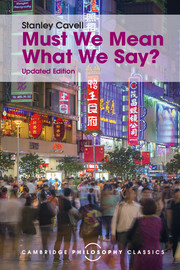Book contents
- Frontmatter
- Dedication
- Contents
- Permissions
- Acknowledgements
- Preface to this edition
- Preface to updated edition of Must We Mean What We Say?
- Foreword: An audience for philosophy
- 1 Must we mean what we say?
- 2 The availability of Wittgenstein's later philosophy
- 3 Aesthetic problems of modern philosophy
- 4 Austin at criticism
- 5 Ending the waiting game: A reading of Beckett's Endgame
- 6 Kierkegaard's On Authority and Revelation
- 7 Music discomposed
- 8 A matter of meaning it
- 9 Knowing and acknowledging
- 10 The avoidance of love: A reading of King Lear
- Thematic index
- Index of names
7 - Music discomposed
Published online by Cambridge University Press: 05 November 2015
- Frontmatter
- Dedication
- Contents
- Permissions
- Acknowledgements
- Preface to this edition
- Preface to updated edition of Must We Mean What We Say?
- Foreword: An audience for philosophy
- 1 Must we mean what we say?
- 2 The availability of Wittgenstein's later philosophy
- 3 Aesthetic problems of modern philosophy
- 4 Austin at criticism
- 5 Ending the waiting game: A reading of Beckett's Endgame
- 6 Kierkegaard's On Authority and Revelation
- 7 Music discomposed
- 8 A matter of meaning it
- 9 Knowing and acknowledging
- 10 The avoidance of love: A reading of King Lear
- Thematic index
- Index of names
Summary
I
It is a widespread opinion that aesthetics, as we think of it, became a subject, and acquired its name, just over two hundred years ago; which would make it the youngest of the principal branches of philosophy. Nothing further seems to be agreed about it, not even whether it is one subject, nor if so, what it should include, nor whether it has the right name, nor what the name should be taken to mean, nor whether given its problems, philosophers are particularly suited to venture them. Various reasons for these doubts suggest themselves: (1) The problems of composers, painters, poets, novelists, sculptors, architects … are internal to the procedures of each, and nothing general enough to apply to all could be of interest to any. One cannot, I think, or ought not, miss the truth of that claim, even while one feels that its truth needs correct placement. There are people recognizable as artists, and all produce works which we acknowledge, in some sense, to call for and warrant certain kinds of experience. (2) There is an established activity and a recognizable class of persons whose established task it is to discuss the arts, namely the criticism and the critics of literature, painting, music…. This fact faces two ways: One way, it suggests that there is something importantly common to the arts, namely, that they all require, or tolerate, such an activity; and that itself may incite philosophical reflection. Another way, it suggests that only someone competent as a critic of art is competent to speak of art at all, at least from the point of view of the experience which goes into it or which is to be found in it, so that an aesthetician incapable of producing criticism is simply incapable of recognizing and relevantly describing the objects of his discourse. (3) It is not clear what the data of the subject shall be. The enterprise of epistemologists, however paradoxical its conclusions have been, begins and continues with examples and procedures common to all men; and moral philosophers of every taste agree in appealing to the experience, the concepts, and the conflicts all men share. But upon what, or whom, does the aesthetician focus? On the artist? On the work he produces? On what the artist says about his work? On what critics say about it? On the audience it acquires?
- Type
- Chapter
- Information
- Must We Mean What We Say?A Book of Essays, pp. 167 - 196Publisher: Cambridge University PressPrint publication year: 2015
- 1
- Cited by

